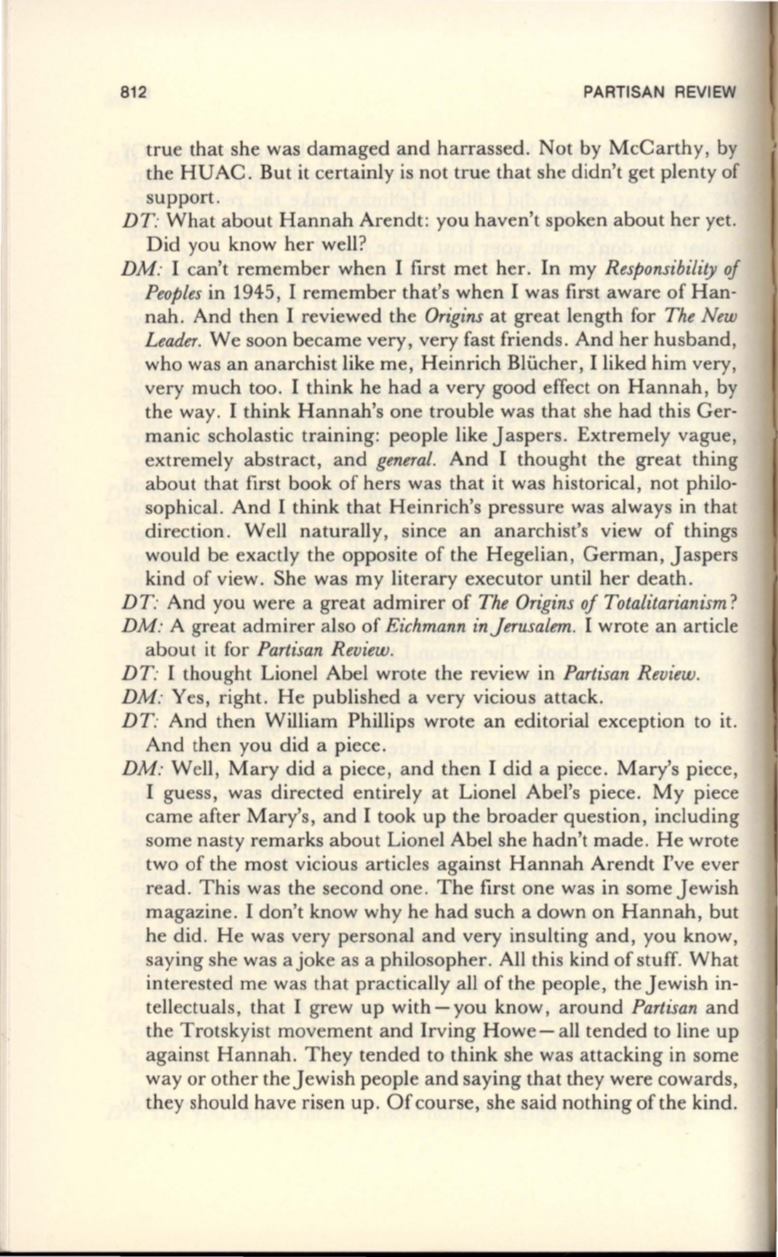
812
PARTISAN REVIEW
true that she was damaged and harrassed. Not by McCarthy, by
the HUAC. But it certainly is not true that she didn't get plenty of
support.
DT:
What about Hannah Arendt: you haven't spoken about her yet.
Did you know her well?
DM:
I can't remember when I first met her. In my
Responsibility of
Peoples
in 1945, I remember that's when I was first aware of Han–
nah. And then I reviewed the
Origins
at great length for
The New
Leader.
We soon became very, very fast friends . And her husband,
who was an anarchist like me, Heinrich Blucher, I liked him very,
very much too . I think he had a very good effect on Hannah , by
the way. I think Hannah's one trouble was that she had this Ger–
manic scholastic training: people like Jaspers . Extremely vague,
extremely abstract, and
general.
And I thought the great thing
about that first book of hers was that it was historical, not philo–
sophical. And I think that Heinrich's pressure was always in that
direction. Well naturally, since an anarchist's view of things
would be exactly the opposite of the Hegelian, German, Jaspers
kind of view. She was my literary executor until her death.
DT:
And you were a great admirer of
The Origins of Totalitarianism?
DM:
A great admirer also of
Eichmann inJerusalem.
I wrote an article
about it for
Partisan Review.
DT:
I thought Lionel Abel wrote the review in
Partisan Review.
DM:
Yes, right. He published a very vicious attack.
DT:
And then William Phillips wrote an editorial exception to it.
And then you did a piece.
DM:
Well, Mary did a piece, and then I did a piece. Mary's piece ,
I guess, was directed entirely at Lionel Abel's piece. My piece
came after Mary's, and I took up the broader question, including
some nasty remarks about Lionel Abel she hadn't made. He wrote
two of the most vicious articles against Hannah Arendt I've ever
read. This was the second one. The first one was in some Jewish
magazine. I don't know why he had such a down on Hannah, but
he did. He was very personal and very insulting and, you know,
saying she was a joke as a philosopher. All this kind of stuff. What
interested me was that practically all of the people, the Jewish in–
tellectuals , that I grew up with- you know , around
Partisan
and
the Trotskyist movement and Irving Howe- all tended to line up
against Hannah . They tended to think she was attacking in some
way or other the Jewish people and saying that they were cowards,
they should have risen up. Of course, she said nothing of the kind.


